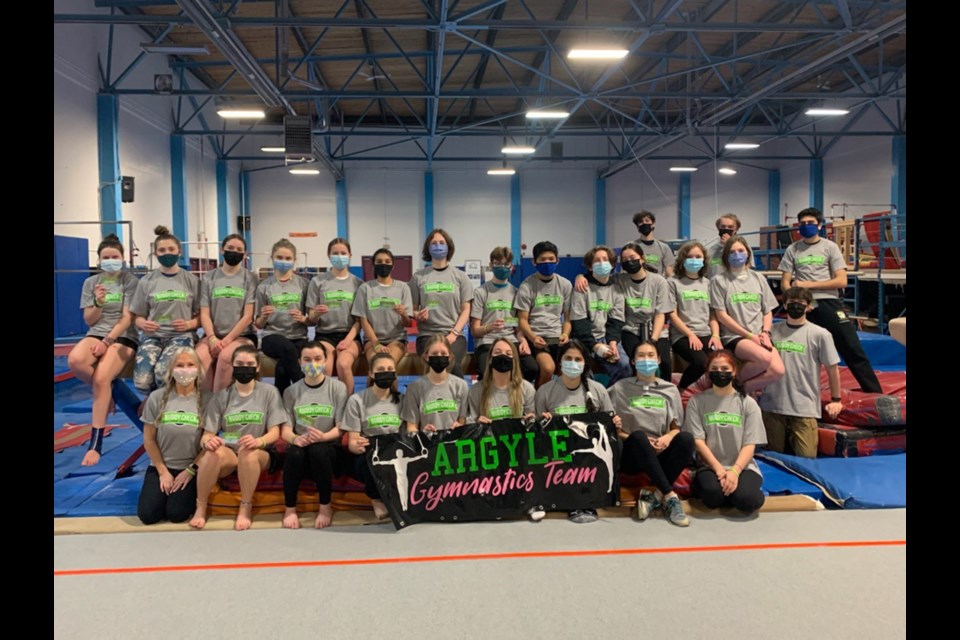North Shore high school athletes are accustomed to battling hard against each other, but this year they’ve all teamed up on a new mental health initiative.
Last month, athletes involved in the traditional winter semester sports of basketball, wrestling and gymnastics could be spotted across the North Shore, wearing warm-up T-shirts labelled Buddy Check For Jesse. The shirts are much more than a mere fashion statement – they are one piece of an important program aimed at promoting mental health and opening up dialogues with young athletes and their peers.
The Buddy Check For Jesse movement was started by Victoria’s Stu Gershman, whose son Jesse Short-Gershman took his own life in 2014. The goal of the campaign is to “destigmatize mental health challenges and to empower and encourage youth and young adults to support one another.”
The Buddy Check initiative has been taken up by the District of North Vancouver Firefighters Charitable Society, and they have partnered with the North Shore Secondary Schools Athletics Association to supply shirts and, more importantly, support materials and mental health information to North Shore high school teams. Aside from raising awareness about mental health issues, a major component of the program is having coaches open up conversations with their athletes, providing information and support.
“I think it’s great because of the conversations we’re starting,” said NSSSAA co-ordinator Alec Lewis, who teamed up with Jeremy Church, the district principal of healthy schools for the North Vancouver School District, to introduce the program into schools. “It’s a topic, mental health, that is hard for opening the door for kids and coaches to have that conversation. And coaches have great relationships, hopefully, with all of their athletes, and that is an adult that they will take the information from. It’s just great that the conversation could begin.”
The DNV Firefighters Charitable Society has helped introduce the Buddy Check program into other sports leagues and associations across the North Shore, including the North Vancouver Minor Hockey Association and North Shore Minor Lacrosse, but this is by far the largest partnership they’ve established so far.
“It’s huge,” said DNV Firefighters Charitable Society vice president Aaron Hoverd, about the link with high schools that has seen them deliver more than 600 packages to be distributed to athletes and coaches. “It's something that the kids [never] really talked about or thought about, and now it's on their radar. They know that mental health is part of their everyday well-being, and to bring it through the sports, we treat it as no different than stretching or preparing for a game. That's something that they're going to have, hopefully, as a lifelong skill, of being able to identify mental health and the ups and downs, and if they do have downs, how to get help and reach out.”
The DNV Firefighters Charitable Society is championing mental health awareness, through the Buddy Check program, because of the impact it can have on a person’s well-being, said Hoverd.
“It’s not something that you need to hide or be afraid of, or be ashamed of it,” he said. “It’s something that we can all talk about amongst each other, and talk about when we’re having hard times, and use the resources around us or our buddies around us.”
The partnership with NSSSAA began back in December with material distributed to teams, leading to conversations about mental health. The T-shirts were distributed in January, and the initial aim was to share the message with spectators and fellow students at games, although COVID-19 restrictions on spectators made that impossible. The program, however, has still been a success, said Lewis.
“When the shirts came in January they’d had multiple conversations already about it, so it wasn't just a one and done,” he said, adding that the coach-athlete relationship helps the message spread. “It’s a trusted person to bring the message forward. It’s not just a random person that walks into the classroom or tells them about it one day and then disappears from their lives. This is someone that they have a relationship with, that they talk to over and over again, and they can touch base a couple of times throughout the seaso,n and it's not forgotten.”
Lewis is aiming to keep the program going in North Shore high schools, potentially with an annual event going forward.
The program will be a success if it helps spread the message that people don’t need to suffer in silence if they are experiencing mental health issues, said Hoverd.
“They’re not alone when they have these times that are a little bit tougher,” he said.
For more information on the Buddy Check program, visit buddycheckforjesse.com.



